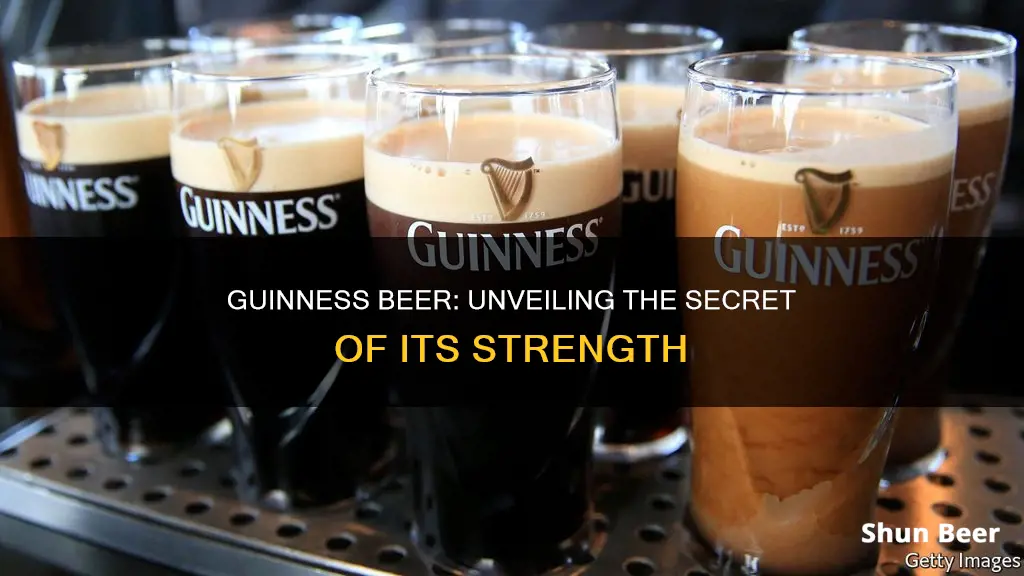
Guinness is a stout beer that originated in Dublin, Ireland, in the 18th century. It is one of the most popular alcoholic beverages worldwide, with a presence in over 120 countries. The beer is known for its dark colour, creamy texture, and rich flavour, which comes from a combination of malted and roasted barley, hops, and yeast. The strength of Guinness beers varies, with an alcohol by volume (ABV) ranging from 4% to 7.5%. The most well-known variant, Guinness Draught, has an ABV of around 4.2%. While Guinness has been marketed as a strength beer in the past, it is important to consume alcoholic beverages in moderation to avoid negative health effects.
What You'll Learn

Guinness's alcohol by volume (ABV) ranges from 4% to 7.5%
Guinness is a stout beer that originated in Dublin, Ireland, in the 18th century. It is now one of the most popular and successful alcohol brands worldwide, brewed in almost 50 countries and available in over 120. Guinness beers have an alcohol by volume (ABV) ranging from 4% to 7.5%, depending on the variety.
The standard draught beer, Guinness Draught, has an ABV of 4.1% to 4.3%. The Extra Cold version is served at a cooler temperature of 3.5°C (38.3°F). The Extra Stout, a precursor to every Guinness innovation, has a slightly higher ABV of 5.6%.
The Foreign Extra Stout, with its distinctive strong and fruity flavour, has the highest ABV among the Guinness beers at 7.5%. This variety is sold in Europe, Africa, the Caribbean, Asia, and the United States, with some regional variations in ABV. For example, it is sold at 5% ABV in China, 6.5% ABV in Jamaica and East Africa, 6.8% ABV in Malaysia, and 8% ABV in Singapore.
In addition to these core varieties, Guinness has created numerous limited editions and special brews over the years, such as the Antwerpen, the Over the Moon Milk Stout, and the 200th Anniversary Export Stout, each with its own unique ABV.
The strength of Guinness beers can vary, but it is important to note that excessive alcohol consumption is associated with various health risks, including liver damage, cancer, and decreased brain function. Therefore, it is recommended to always drink in moderation.
Guinness Beer: Why This Famous Drink Is Dark Ruby
You may want to see also

Guinness has a calorie count influenced by its alcohol content
Guinness is a stout beer, made from a grist (grain) that includes roasted barley, which gives it its intense flavour and dark colour. It is one of the most consumed and popular Irish beers in the world.
The calorie count of Guinness is influenced by its alcohol content. A 12-ounce serving of Guinness Draught has 125 calories, while a 12-ounce Budweiser has 145 calories, Heineken has 142 calories, and Samuel Adams Cream Stout has 189 calories. The Guinness Draught has a lower alcohol content, at 4.2% alcohol by volume, compared to 5% for Budweiser and Heineken, and 4.9% for Samuel Adams Cream Stout.
The calories in a 12-ounce Guinness beer vary between 114 and 194 calories, depending on the variety. For example, the Nitro Cold Brew Coffee has 114 calories, while the Foreign Extra Stout has 194 calories. The calorie count for various types of Guinness is influenced by their alcohol content, as well as their particular recipe.
Guinness is also lower in calories than the average beer, even though it has a richer mouthfeel and fills you up. This is because alcohol is the main source of calories in any alcoholic beverage, so a Guinness will naturally be lower in calories than a beer containing more alcohol, even though it might seem more filling.
The famous advertising slogan, "Guinness is Good for You", was first used in the 1920s. While Guinness does contain some antioxidants, B vitamins, and fibre, the negative effects of excessive alcohol intake are greater than any health benefits. It is important to always drink Guinness and other alcoholic beverages in moderation.
Guinness Beer: A Unique Irish Dry Stout Experience
You may want to see also

Guinness is known for its velvety mouthfeel and richness
Guinness is an iconic Irish beer known for its velvety mouthfeel and richness. It is a stout that originated in the brewery of Arthur Guinness in Dublin, Ireland, in the 18th century. The beer gets its distinctive texture and flavour from the use of nitrogen gas in the brewing process, which results in smaller bubbles than carbon dioxide and gives the beer a smoother, creamier mouthfeel. This also contributes to the beer's iconic deep, ebony darkness crowned by a dense, creamy head.
The use of nitrogen over carbon dioxide in the carbonation process is a hallmark of the Guinness experience and sets it apart from other beers. It gives the beer a velvety smooth and silky mouthfeel, making each sip a luxurious indulgence. Despite its robust appearance and flavour profile, Guinness has a surprisingly light body that doesn't weigh down the palate. This combination of smoothness and lightness makes Guinness exceptionally drinkable, allowing it to be savoured slowly over time without becoming overwhelming.
The flavour of Guinness derives from malted barley and roasted unmalted barley, with the unmalted barley being a relatively modern addition. The roasted barley gives Guinness its intense burnt flavour and very dark colour. The beer also undergoes a process called nitrogenation, which pairs nitrogen gas and carbon dioxide, contributing to its velvety texture and richness.
Guinness has a long history of marketing campaigns, with some of the most notable advertisements created by S.H. Benson's advertising agency in the 1930s and 1940s, featuring slogans such as "Guinness for Strength" and "Guinness is Good for You". The beer has also been associated with several health benefits, including its iron content and positive effects on heart health. However, it's important to note that Guinness does not make any official health claims about its beer.
Guinness Beer and Coffee: What's the Connection?
You may want to see also

Guinness has been marketed as good for you and for strength
Guinness, the famous stout beer, has been marketed as "good for you" and "for strength" since its first advertising campaign in 1929. The campaign featured people performing incredible feats of strength, fuelled by Guinness. The slogan "Guinness is good for you" became popular in the 1920s, '30s and '40s, and the beer was promoted for its nutritional benefits, including antioxidants, B vitamins, and soluble fibre.
Guinness contains folate, a B vitamin necessary for DNA production and cell division. It is also a source of iron and is relatively low in calories compared to other beers. The original Guinness, known as Guinness Extra Stout, contained live yeast, which gave it a high iron content. For this reason, it was once given to pregnant women, nursing mothers, and anemic individuals.
The belief that Guinness is good for you may also have originated from word-of-mouth. According to Domhnall Marnell, the Guinness ambassador, when the company was preparing for its first ad campaign in 1929, they sent out marketers to ask Guinness drinkers why they chose the beer. Nine out of ten replied that they believed it was healthy for them.
While Guinness has been marketed as good for you and for strength, it is important to note that excessive alcohol consumption can lead to health problems such as liver damage, cancer, and decreased brain function. Most health providers advise against drinking alcohol during pregnancy or while breastfeeding due to potential risks to the baby.
The Irish Pride: Guinness Beer's Roots and Heritage
You may want to see also

Guinness is one of the most successful alcohol brands worldwide
The brand's success can be attributed to several factors, including its iconic status, innovative spirit, and effective marketing campaigns. Guinness is known for its distinctive dark colour, creamy texture, and rich flavour, achieved through a blend of malted and roasted unmalted barley. The brand has also pioneered new products, such as alcohol-free beer and cold brew coffee beer, and innovative dispensing technologies like Guinness MicroDraught, which allow for a perfect pour in various settings.
Guinness has a long history of marketing, from television advertisements to beer mats and posters, with some of the most recognisable campaigns created by S.H. Benson's advertising in the 1930s and 1940s, featuring slogans such as "Guinness is Good for You" and "Guinness for Strength." The brand has also been associated with cultural moments, such as its first pan-African campaign in five years, "Black Shines Brightest," celebrating African creativity and ingenuity.
In addition to its marketing prowess, Guinness has a strong focus on quality and brand building, investing in long-term initiatives like its regenerative agriculture pilot in Ireland, which aims to reduce the carbon emissions of barley production. The brand's parent company, Diageo, a global leader in premium drinks, also contributes to Guinness's success, providing expertise and resources to support the brand's growth and expansion.
Guinness's strength varies depending on the variant, with an alcohol by volume (ABV) ranging from 4% to 7.5%. The standard draught beer, Guinness Draught, has an ABV of 4.1% to 4.3%, while other variants like the Foreign Extra Stout and Special Export Stout have higher ABVs of 7.5% and 8%, respectively.
Guinness Beer: German or Irish?
You may want to see also
Frequently asked questions
Guinness beers have an alcohol by volume (ABV) of between 4% and 7.5%. The standard draught beer has an ABV of 4.2% to 4.3%.
A 12-ounce serving of Guinness Draught has 125 calories, while the Extra Stout has 149 calories. The calorie count varies depending on the type of Guinness and its alcohol content.
While Guinness beers contain some antioxidants and nutrients like folate, excessive alcohol consumption is associated with negative health effects. Moderate drinking may offer some health benefits, but these should be weighed against potential risks.







